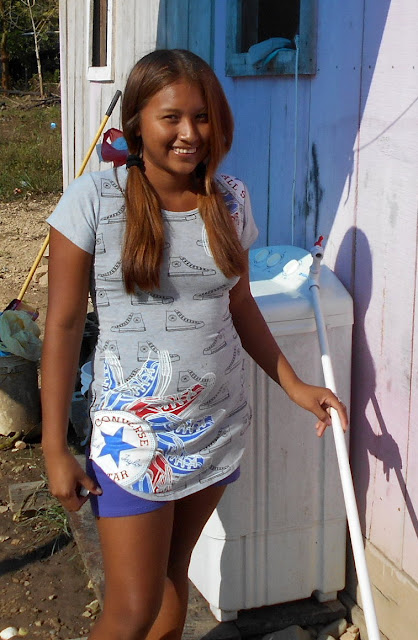The Volunteers just keep on coming. This time, a mixed group
from U of AZ, Pace and 4 Yalies. (I took it upon myself to deliver the news
about the Ivy basketball play-off results - They wished Princeton well in the NCAA tournament). They got to experience mixing
concrete by hand, mortaring concrete blocks and setting them, sawing rebar and
pacay (a very tough wood). Once again, impressed by
their good hearts to use
Spring Break for service to others and their work with a smile. Rather than party on a beach somewhere lapping up beer.
Benildo’s 84 year-old father is getting one of the new GB
Bano units. He felt the drainage pit was too small, so he jumped in and doubled
its size. He is one tough cookie !!
I'll be happy if I'm this strong at 74.
Here’s a load of wood headed to the mill, that is king size. Note that all logs are marked by inspectors as to point of origin and
permit #, to insure that it is not wood pirated from the Guna or Embera
reservations. Pirating wood has greatly diminished, but still goes on. Just ask
my neighbor. When a single tree can be worth $10,000, the temptation is high.
 |
| The chamber pot in its simplest form |
The Chamber Pot
In Piriati yesterday, I saw a woman carry a bucket out to her
latrine and dump the contents inside. Not wanting to embarrass her, I asked my
friend Jonathon if this was common practice. I was surprised to learn that it
is VERY common practice – I’ve just never noticed it before. He says NOBODY
goes to the latrine after dark. EVER. He seemed amazed that I didn’t know this
after living in the 3rd world for 6 years. Truth is – I’ve never had
to use a latrine the whole time outside the US. I’ve always lived in a house
with flush toilets – In San Luis, Lima and here in Torti. And none of the
Volunteers who used a latrine ever mentioned it.
 |
| An elegant seat for the humble chamber pot - 1800's |
My powers of perception duly chastised , being a Water
& Sanitation guy, I decided to investigate the chamber pot and here’s what
I found:
As a prelude to the toilet, the chamber pot has a long and
noble history. We know that they have been used since 600 BC by the Greeks.
They remain in common use in many parts of rural China and the Philippines (and
other 3rd World countries) today and are frequently given as wedding
presents to assure the couple’s good luck. The device has gone by many names in
English, to wit – jordan, jerry,
guzunder, potty, or thunder pot. It was also known as a chamber utensil or bedroom ware. In Spanish, the simple “cubo” (bucket suffices.
Whatever
the name, the concept and purpose is simple. It provides a convenient, indoor
receptacle for human bodily waste, which can then be removed to a more suitable
disposal site. In a wealthier home, it would be removed on demand by a “chamber
maid”, who discretely covered it with a cloth or its own lid and carried it
away. In the upscale parts of cities, the pots were stacked in the alley,
awaiting the morning arrival of the Chamber wagon or Sweet wagon (possibly the
origin of the modern “Honey Wagon”). In less opulent parts of town, the pots
were simply emptied into the street gutter, where they joined horse manure and
other waste. In rural settings they were carried to the cesspool or deposited
in the outhouse.
The
Chamber Pot came in all sorts. For the wealthy, they were elaborate porcelain
affairs with matching tops, often set below an ornate chair with a large hole
in the seat. For the less fortunate, they were a simple ceramic bowl, often
with a convenient handle. The poor often used whatever cooking or mixing pot
was available from the kitchen. Thus the expression “He doesn’t have a proper
pot to piss in”.
There
were even songs about the infamous pot, such as this British ditty:
Well, I took the crayfish
home, and I thought he'd like a swim
So I filled up the chamber pot, and I threw the
bugger in
In the middle of the night, I thought I'd have a
fit
When my old lady got up to a-have a shit
Husband, husband, she cried out to me
The devil's in the chamber pot, and he's got
hold of me
Children, children, bring
the looking glass
Come and see the crayfish that bit your mother's
arse
Children, children, did you hear the grunt
Come and see the crayfish that bit your mother's
cunt
It's the ending of my story; I don't have any
more
I've an apple in my pocket, and you can have the
core
Although, now that I think
of it, I did use a cup or bottle on occasion to avoid the long hike to the
basement bathroom in Witherspoon Hall late at night.















































